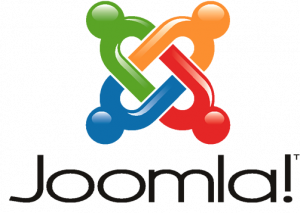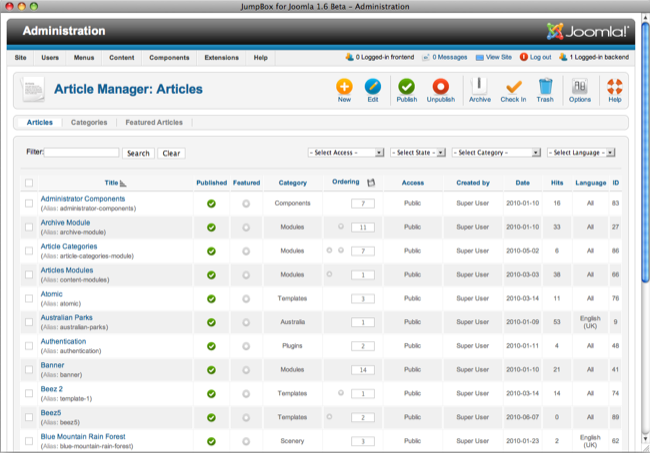
Here at Netwise our platform of choice for most medium-sized websites is Joomla, and every now and again our clients ask us why. Why Joomla, and not, say, something from Microsoft or a built-to-order system coded from scratch? With so many options out there to choose from, why did we choose this one?
Before we answer that let’s get clear about what Joomla is. Full details about Joomla can be found on the Joomla website and in this Wikipedia page, but put simply: Joomla is an award-winning open source content management system (CMS) for publishing content on the web and intranets. It’s written in PHP (an open source scripting language) and stores data in a MySQL database. With Joomla it’s possible to create fully dynamic, database-driven websites with full control over the content via a web-based back-end administration area.
There are many such CMSs out there, and new ones are being created all the time. here are the reasons we use Joomla.
| Open Source | Joomla is open source software, which for us means that we have full access to the code and thus unlimited control over the systems we create using it. With virtually all commercial products you are unable to make any changes at the code level, and as a consequence are limited to the features and functionality provided by the application. |
| Customizability | Further to the point above, having skilled developers and access to the code means we can customize, optimize, tweak and extend Joomla-based websites to our heart’s content. |
| Multi-language Support | Joomla has full multi-lingual support on both the front-end and back-end administration areas. Most of the sites we create offer content in English and Japanese, and Joomla makes it possible to create and manage completely mirrored or partially multilingual websites using a single CMS. |
| Extensibility | At the time of this writing Joomla has over 8000 extensions which add functionality and features to Joomla at little or no cost and with only minor coding required. Adding an online store, banner ads, social media, polls, video content, user forums and more has never been easier. |
| Popularity | Joomla has been downloaded over 23 million times and is estimated to power 3% of all websites. |
| Longevity | A lot of CMSs come and go, but Joomla has stood the test of time and continues to evolve and improve thanks to the tireless efforts of a dedicated community of developers. |
| Experience | We’ve built a lot of websites with Joomla over the years, and our knowledge of and capability with it are considerable. If we were in the business of throwing together simple websites with only basic functionality then perhaps any old CMS would do. However, the sites we build are typically complex and require a lot of customization and extra coding. Knowing our platform inside and out means we can spend a lot less time figuring our how to do something and focus instead on getting the job done. |
So that covers the reasons why Joomla is a great platform choice for many of the sites we build, but what about the other options out there? What makes Joomla a better choice than those? Doesn’t Microsoft or one of the other software companies make something equally useful or functional? Indeed they do. Microsoft makes a powerful content and document management system called SharePoint which is great for intranets and Windows-centric networks, but is limited in the terms of customization and is notoriously difficult to configure and manage.
There is also the issue of cost. With SharePoint you have to pay for a Windows server operating system, MS SQL Server and SharePoint itself, meaning the cost for just the platform itself quickly runs into thousands of dollars. While hosted SharePoint is available there is are very few options for that here in Japan. SharePoint is a great platform for serving content in a Windows-based network environment, but for made-to-order medium-sized websites is an expensive and inflexible option.
There are other commercial options as well, products like Sitefinity and Cascade Server and IBM Webshere or a hundred others, but by and large they share traits that make them unsuitable for the kinds of sites we build: expensive, difficult to customize and proprietary.
Looking closer to home we can compare similarly-positioned open source solutions like WordPress, Drupal and Plone. These–with Joomla–comprise the top tier of the open-source CMS market and are where most apples-to-apples comparisons are made. Rather than write yet another one of these here I’ll show you this nifty chart from Devious Media which does an excellent job of highlighting the differences.
So what’s our rationale for choosing Joomla over the others?
WordPress is a great CMS and one we use ourselves for blogs and smaller sites (like the one you’re viewing now). However, it still has mediocre multilingual support and isn’t as extensible as Joomla. Drupal is wickedly powerful and a dream platform for coders, but for “typical” users (like most of our customers) it is simply too complex and difficult to use.
For us, Joomla strikes the just right balance between functionality and user-friendliness. Check out the portfolio for some examples of sites we’ve built using it.
Finally, what does this mean for you? How does using Joomla benefit you, the customer?
Lower Development and Running Costs
With Joomla much of the “grunt work” of development has already been done, which means less code to write and test. All of the fundamental pieces–user account management, log in functions, content creation and editing, image and file management, menus and navigation, etc.–are built and working from the start. This means less development time and thus lower cost.
Extending and adding features to Joomla later is also easier than coding them from scratch, which reduces running costs for upgrades and improvements.
Quicker Time to Launch
Less coding means shorter time to market for your website or application. Using a platform like Joomla can shave weeks or even months off a project’s duration.
Freedom from Vendor Lock-in
Joomla and all of the technologies behind it–PHP, MySQL, Apache–are open source well-known among web developers around the world. This means that if you ever want to change vendors you won’t have to look hard to find a company or individual with the necessary skills.
Improved User Experience
As anyone who’s used a custom-built CMS knows, these are rarely designed with the user experience in mind. Hidden behind a login function and visible only to site administrators, these screens are typically primitive and offer only the bare minimum in terms of functionality.
The Joomla administration area is well-designed and laid out, and looks and behaves like what it is: a professional web publishing platform.

And there you have it. This is why we use–and love using–Joomla. You will, too.




